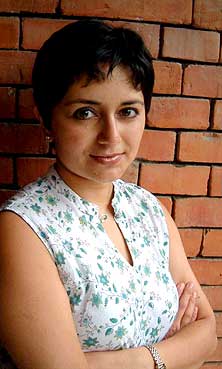 The Tutor of History, the second novel by a Nepali in English, is out this week. The author, Manjushree Thapa, is known for her English translations of literature in Nepali, and her critical articles in Nepali and English journals. Her work has all along been focussed on studying in depth Nepal, the people of Nepal, their history and culture, their language and literature.
The Tutor of History, the second novel by a Nepali in English, is out this week. The author, Manjushree Thapa, is known for her English translations of literature in Nepali, and her critical articles in Nepali and English journals. Her work has all along been focussed on studying in depth Nepal, the people of Nepal, their history and culture, their language and literature. These diverse efforts are critically linked to the compulsion she feels to understand herself and her compatriots who are presently passing through a transitional period of tremendous importance. The schism between Nepal traditional and emergent and its anguished resolution is the essence of her novel. The convergence of changes, social and personal, orderly or erratic, promises the resolution.
While old feudal Nepal brought forth peasants, artisans, priests, soldiers, administrative staff and the ruling class, the newly emergent Nepal has thrown up new classes and categories of people. Of these categories, the more active and influential ones, both of the old and the new order, have been given selective representation in the novel.
Jimmawal Baje, for instance, combines in himself with ease his renunciative religion and his worldly desires. Then there is Rishi, the protagonist after whom the novel is named, an educated but unemployed youth, and Binita, a widow. There is Nayan Raj, a film star standing for elections from Khaireni Tar, the locale of the novel. Thapa's characterisation is excellent-her main characters are typical yet very convincingly individualised. They change and develop, they do not disintegrate or head for a nihilistic deconstruction of themselves. There is a kernel of indestructible humanity in them, which relentlessly urges them to reach for fulfilment.
For us Nepali-speaking readers the Nepali world presented in the novel is in some senses a given. We proceed to read the novel with prior knowledge. This, however, should not make us complacent that we know all there is to learn about ourselves and our society. The novel having been written in English, a language alien to the community described, assumes the aspect of clinical detachment and so the picture that emerges is, in large measure, an evaluation of us. A mirror is held to us and the picture that results is not as we might be used to or as we might like it to be. Incidents, remarks and conversations, however seemingly stray or redundant, are organically organised and form parts of a connected whole. Thapa has, while writing the novel in English, refused to follow the easier way of catering to the taste of westerners or pandering to their pre-conceived notions. For her, writing is a mission, a sacred covenant between the writer and the Nepali people.
This trait is discernible in the many translations that we come across in the work of Nepali folk songs, proverbs and idiomatic expressions. In her English rendering of these, she has struck a neat verbal equivalence between what translation theorists call the Source Text (in this case, Nepali), and the Target Text (in this case, English). The translations are Source Text Oriented, even Source Language Oriented, yet they are literary texts in the target literary system, English, too.
Towards the close of the narrative, we begin to view Rishi, the protagonist, as a harbinger of a new realisation, a re-affirmation of valuable principles we have lost sight of-that all theorisation and practice of democracy, liberty and equality boil down to the actualisation of the \'private dignity of individuals'. Once Rishi dreamed of \'collective liberation'. Now he is a rebel against totalitarian revolution. He is a rebel against various manifestations of social, political and religious mores. Manjushree Thapa's accomplished first novel will not be a one-time hit. She will be a recurrent success story.
Indra Bahadur Rai is the foremost writer and intellectual in the Nepali language in India. He is the author of the classic work, Kathaputaliko Man (The puppet's heart). The above review is excerpted from a speech he delivered at the launch of The Tutor of History on 15 October in Kathmandu.


